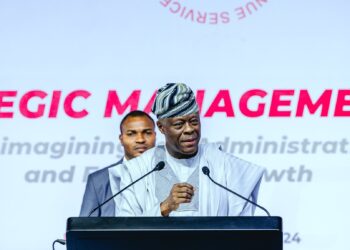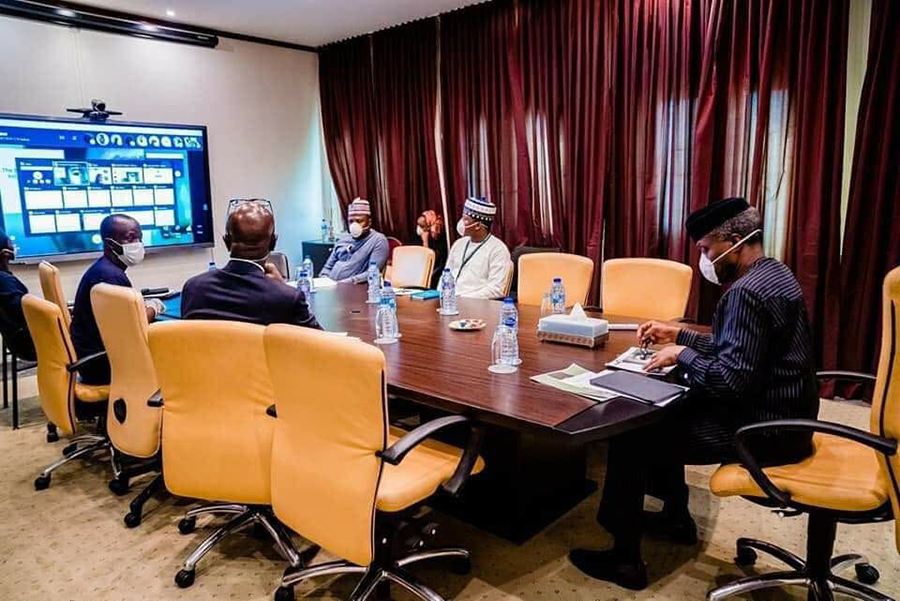“What if the COVID-19 onslaught continues in a second wave? For how long shall we continue to rely on the world for anything and everything at every time?” said Godwin Emefiele, Nigeria’s Central Bank governor. He added, “As a nation, we cannot afford to continue relying on the world for our food, education, and healthcare.”
In keeping with his vow to run Nigeria’s Central Bank effectively by supporting economic growth and the developmental necessity for Nigeria, Godwin Emefiele has made sure Nigeria’s Central Bank becomes an important driver of growth to Nigeria’s economy
Nairametrics interviewed investment bankers and financial experts asking for their opinions on what policies they would implement if they were the helm of CBN.
Their responses were as interesting as they were varied ranging from diversifying the economy, adjusting the value of the naira to fighting inflation
(READ MORE:Naira appreciates to N450/$ in parallel market, as CBN intervenes)

Anthony Okafor, Ph.D. Head, Investments & Strategy at Vyne Investment Partners
The Nigerian economy requires an economic vaccine to stimulate the economy and combat the impending recession. The turbulence in the global markets caused by the pandemic and the decline in crude oil prices has accelerated the risk levels in the Nigerian financial system. Monetary policy efforts need to be targeted at sustaining the economy through this cycle.
The aggregate money supply in the economy needs to be elevated via a combination of conventional and non-conventional cash injection measures, including a significant reduction in cash reserve ratios to salvage the economy.
Concerns about inflation may have to be subordinated to allow for productivity and a chance to restart the economy. The CBN’s 50 billion naira fund for households and small businesses is commendable; however, more of such funds would be needed in the coming weeks.
The economy has struggled to recover after the 2014 oil price shock, implying that effective policy measures need to be activated, including the injection of further stimulus packages to support the real sector. The economy has lost over 70% of its revenue, fiscal and monetary authorities might be looking at intervention funds between $50 billion to $70 billion in the next three years.
The earlier $22.7 billion borrowings put on hold needs to be revisited to fund this intervention as opposed to a seasonal devaluation of the naira.
Devaluing the currency is not a magic wand, and currency devaluation as a means of addressing revenue shocks is merely a race to the bottom.
(READ MORE:Nigeria’s food security, GDP growth hinge on financial inclusion of farmers)

Omeiza Makoju, ACCA, energy expert with Nigeria’s leading oil firm.
“Never let a good crisis go to waste.” This quote has been attributed to Winston Churchill and applies to us at this dire time. In a Nigerian context, the COVID-19 pandemic, dwindling oil prices, and the consequential economic crisis we currently face provides us with a rare opportunity to take drastic measures to address our problems as a nation.
These will be bitter pills to swallow at this time but the crisis has made it easier for our leaders to administer the pills. At the helm of the CBN (Central Bank of Nigeria), Mr. Godwin Emefiele has taken several commendable steps to stimulate sustainable economic growth at this trying time.
The most notable is the plan to inject N3.5T stimulus into the economy in the form of various interventions. Another notable move was the adjustment of the exchange rate in response to “market fundamentals.”
The question as to how well these steps will improve the lives of the average Nigerian still begs to be answered. Putting myself in the shoes of the CBN (Central Bank of Nigeria) governor at this time, I would devalue the Naira and put more emphasis on improving the rate of financial inclusion in Nigeria.
(READ MORE:CBN, Bankers’ Committee order banks not to lay-off any staff)
Taking these drastic actions will be as bold and as progressive as those taken by Mele Kyari, NNPC (Nigerian National Petroleum Corporation) GMD, in removing the fuel subsidies from every Nigerians pocket.
These will certainly be difficult to contend with and will be fraught with political controversy as was the removal of fuel subsidies. Naira Devaluation The devaluation will be hard on us in the short-run but with the right monetary policies put in place by the CBN to support the vision; the temporary difficulty will lead to sustainable economic growth for our nation in the long-run.
Financial Inclusion Coincidentally, the CBN had set a target to achieve 80% financial inclusion in Nigeria this year, 2020.
But EFInA reported in February this year that it is unlikely that this target will be met due to demographic changes. Interestingly, the subscriber records of the NCC (Nigerian Communications Commission) show a teledensity of over 98% (a population estimate of 190 million was used) as at February 2020.
Looking at all this information together reveals a compelling opportunity for the CBN to cut red tape and work closely with relevant stakeholders to do much more in leveraging technology to achieve their financial inclusion target.
The current business realities of social distancing, working remotely and the unprecedented dependence on technology during this pandemic also supports this financial inclusion strategy. No matter what happens, our outstanding resilience as Nigerians will see us through.
(READ MORE:Official: CBN says N360/$1 not devaluation but “adjustment of price”)
Princejoe Nnaji Corporate Strategy Analyst at Nigeria’s top tier-1 bank.
As the CBN governor, I will pursue policies that support the exportation of goods and services that are essential to diversify the Nigerian economy. The goal is to increase revenue generation which would drive sustainable growth and increase our external reserves.
The policies should be aimed at encouraging the local processing of raw materials to semi-finished form or finished form in the medium or long term respectively instead of exporting raw materials without any value add. This, in turn, will generate more value, boost local production, create employment, and increase investment in the infrastructure sector which is a key driver of GDP growth.
These policies cannot be introduced in isolation because there is a need to create a conducive business environment to aid these businesses to thrive. Along with ease of getting credit, the Central Bank of Nigeria will need to co-ordinate with the government across all levels to sustain the gains on the World Bank’s ease of doing business ranking (currently ranked 131 among 190 economies).
READ ALSO: Covid-19: SBM Intel lists out industries that may be out of business post Coronavirus
Emmanuel Emeka Orji Emerging and Frontier Markets | Fixed Income | Comercio Partners
Whilst the move to unify and eliminate the multiple exchange rate regime promised to the IMF is very much welcomed and a step in the right direction, the CBN still needs to intensify its efforts by adopting some other tactics in the bid to save the Nigerian economy.
(READ MORE:Just-in: CBN Governor guarantees investors over forex repatriation)
Furthermore, whilst a low-interest environment may be good for the local manufacturing and real sector, we believe our interest rates are significantly low compared to our peers in the Sub Saharan African region, therefore, putting Nigeria at a risk of attracting less FDIs and FPIs.
Nevertheless, given that our economy is largely import driven and a lack of foreign inflow could further put pressure on our external reserves, we believe the CBN needs to continue to find ways to keep our interest rates competitive whilst also continuing the various intervention programs to help grow the real sector and ultimately significantly reduce the reliance on importation



















